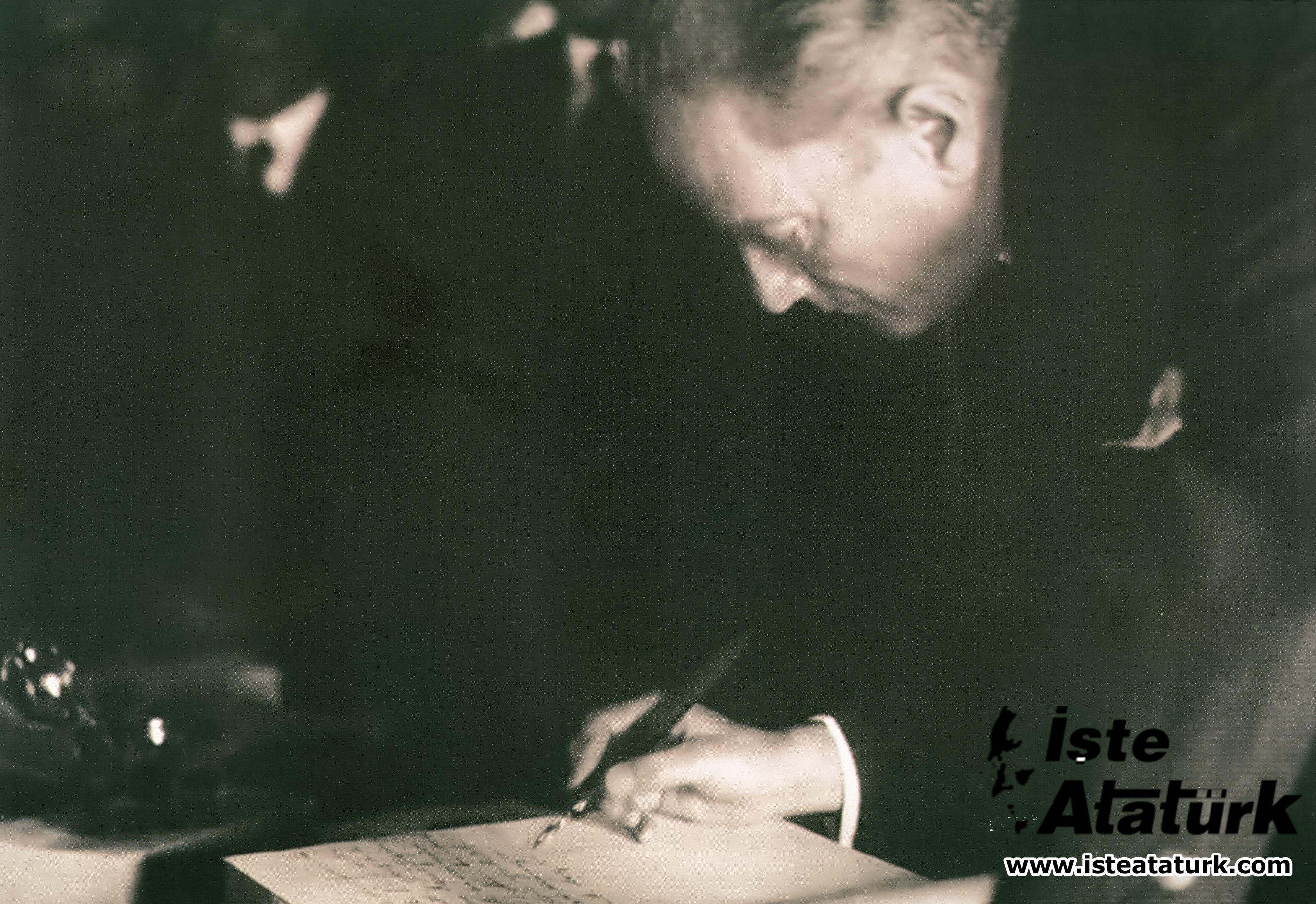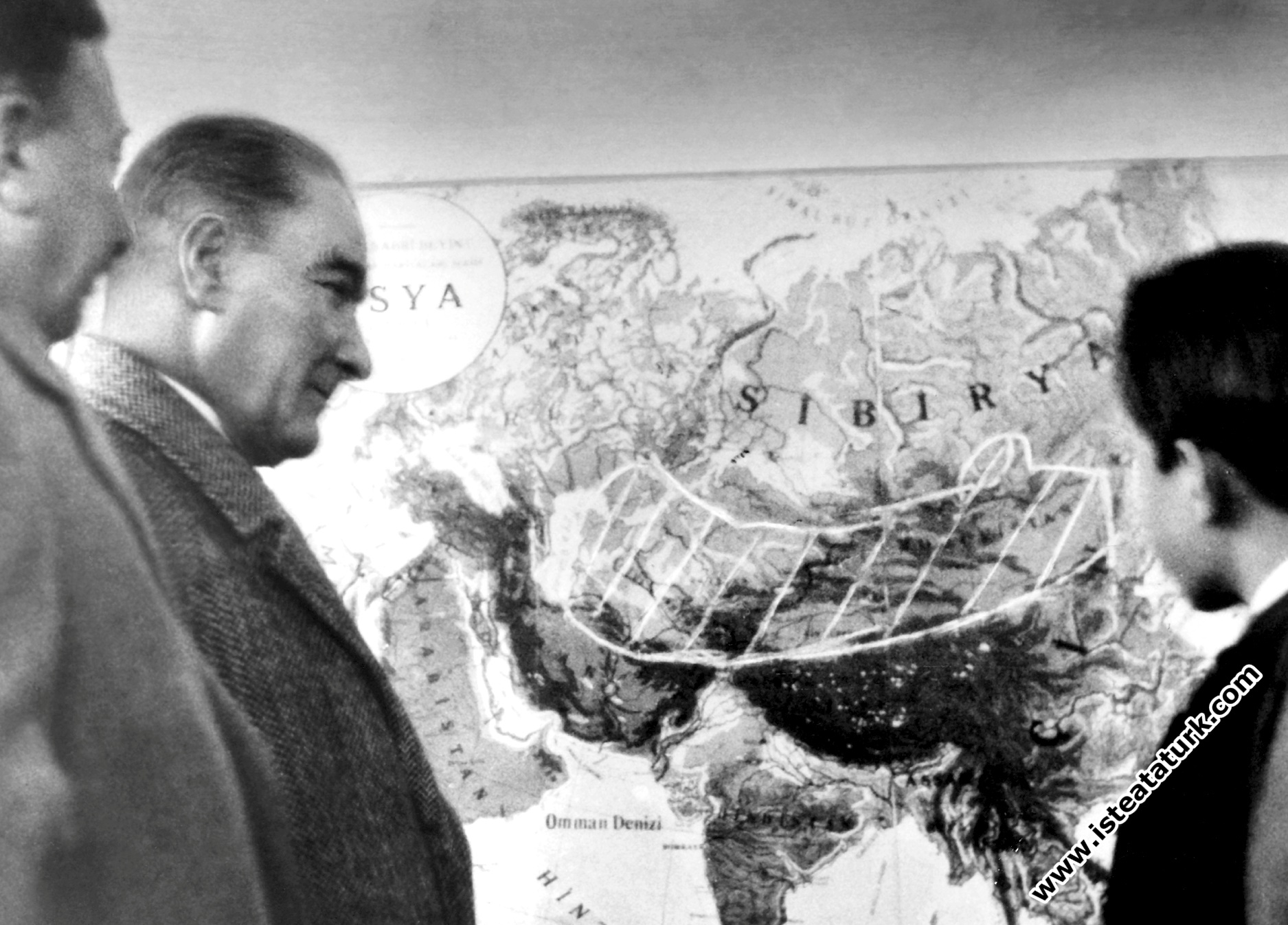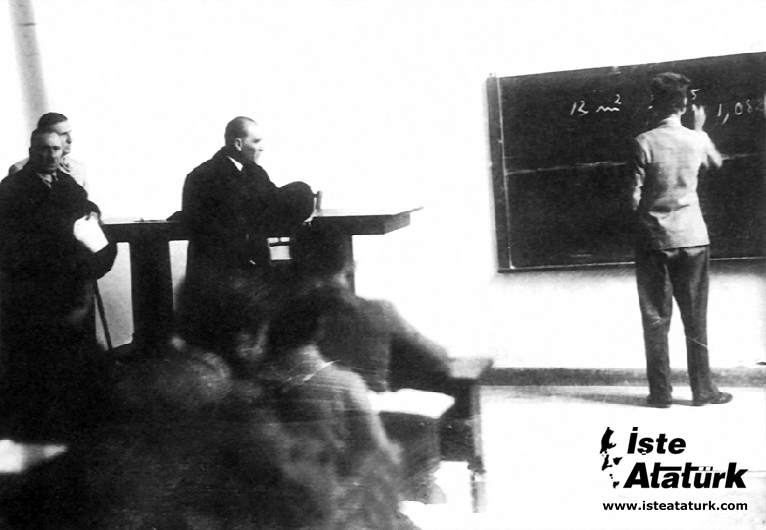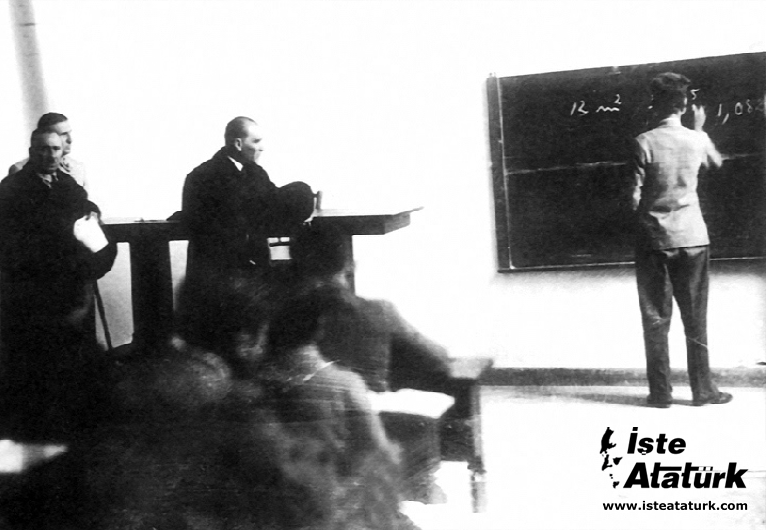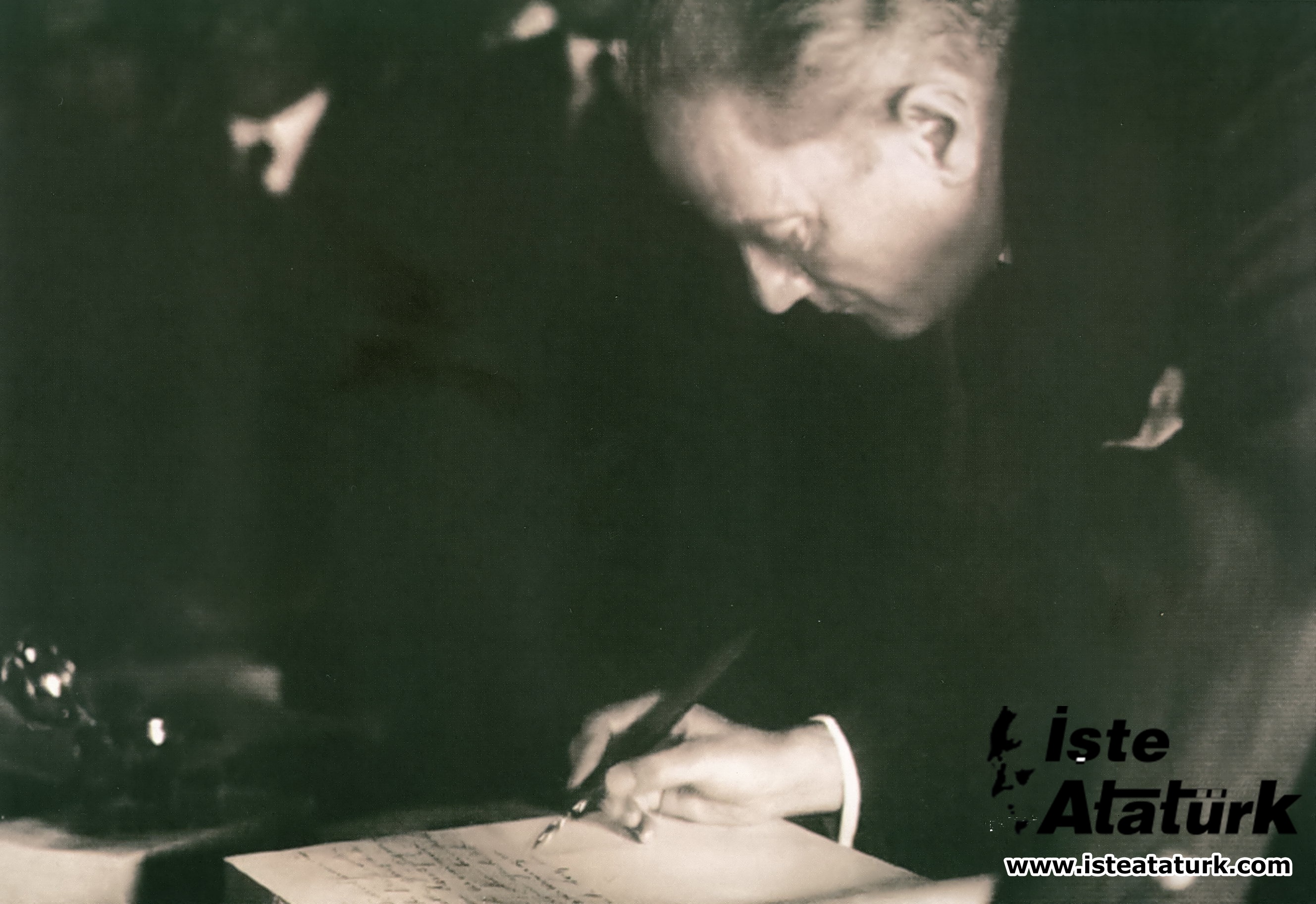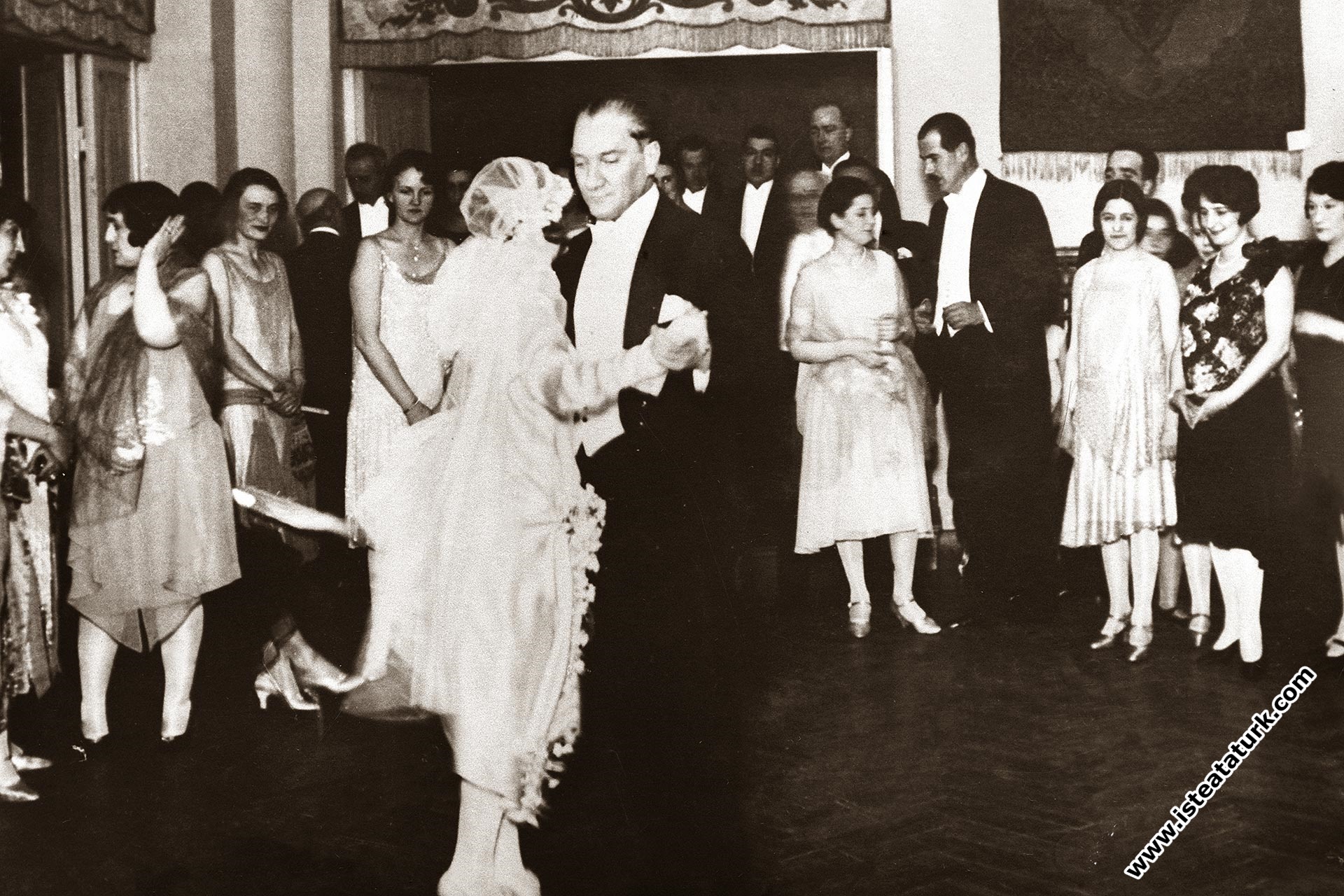
Atatürk and Women's Rights
Character Size
"The source of social life is family life" Mustafa Kemal Atatürk
ATATÜRK and WOMEN'S RIGHTS
Atatürk approached women from a humane perspective, as he did with men, and realized contemporary breakthroughs that would ensure that women are equated with men in civil, political and cultural rights. The first condition of being a modern society and establishing a modern state of law was to recognize and respect the rights of women as citizens and free people. Because men and women created the concept of human together and gave a meaning to this concept together. Acting with this understanding, the Atatürk revolution gave Turkish women their social and political rights that have been neglected for centuries. Great person Atatürk, who evaluated the selfless contributions of Turkish women very well before and during the War of Independence, which determined the existence of the Turkish people, gave women the rights they deserved and brought her to the respected status in the society that she longed for. Atatürk believed that the use of political and social rights by women was necessary because it would bring happiness and dignity to humanity. She wanted Turkish women to work for peace and security by giving their hand to world womanhood.
The freedom and rights granted to the Turkish woman are, in a sense, nothing but her return to the true spirit of her race.
When we go to the known histories and migrations of Central Asian Turks, it has been seen that women have always been in powerful positions. Words such as "Queens who know the state" or "By the order of Hakan and His Hatun" appear in the Orkhon Inscriptions starting from the seventh century, showing that ancient Turkish women maintained their status of equality.
According to Ziya Gökalp, ancient Turks were in many ways both democrats and feminists1. Another reason why Turks became feminists was that shamanism in ancient Turks was based on the sacred power of women. On the other hand, Toyonism religion gave importance to the sacred power of men. The equality of Toyonism and Shamanism led to the equal recognition of men and women by law. For this reason, there was a condition for men and women to be together at the meetings of every business. For example, since the public authority was jointly gathered by both Hakan and Hatun, when an order was written, if it started with the phrase "Hakan commands", it would not be bowed to. In order for an order to be accepted, it should have started with the words "Hakan and Hatun are commanding". Only when Hakan on the right and Hatun on the left sat the envoys did he appear before both of them. In feasts, assemblies, At Worship and Ceremonies, War and Peace Committees, the Hatun would be with Hakan. Women were not forced in any way to cover up. Monogamy was dominant among the ancient Turks. The official spouse could only be one. In addition, the existence of the coven could not prevent the authority and rights of the legal spouse. The Kuma children could not receive a share of the inheritance. The sons of Kuma could never be Hakan, even if their father was Hakan.
Ziya Gökalp, in his book titled "The Principles of Turkism," argues that the maternal lineage and the paternal lineage were equal in value among the Old Turks2. Accordingly, nobility comes not only from the father, but also from the mother. To be considered full lineage, a person must be both maternal and paternal. The young people who were going to marry could get a name from the Provincial Council and have citizenship law after passing the heroic test.
According to Ziya Gökalp, women were generally Amazons in ancient Turks. Equestrianism, musketeering, heroism were among the skills of Turkish women as well as Turkish men. Women could directly become rulers, castle guards, governors and ambassadors3.
As seen in the story "Bamsi Beyrek", one of the Dede Korkut Stories, which has been told among the Muslim Oghuz since the eighth century, it is interesting that a young man who is going to get married seeks horsemanship and musketeer skills in his wife. Bamsi Beyrek describes the girl he will one day buy for his father as follows:
"Father, buy me such a girl that she can get up before I get up from my place, she can get on before I get on my black ram horse; she will bring me head before I reach the enemy. Get such a person," he said. His father, Mr. Büre Han, said;
Son, it turns out that you don't want a girl, you want a comrade for yourself. “4,” he replies.
As seen in these lines, it is expected that the girl who will marry a gentleman's son will be a warrior who shoots arrows, wields a sword, rides a horse, and can fight the enemy and cut off his head.
Banu Çiçek is a passing girl who can compete with Bamsi Beyrek in these matters. Banu Çiçek puts Bamsi Bey to the test during hunting, horse riding, archery and wrestling, and after she realizes that she is strong enough, she decides to marry him. This incident shows what kind of characteristics young girls look for in a man they will marry and proves that they make their choices freely.
In another Dede Korkut story, we see the continuation of this brave and warrior character of Turkish women after the acceptance of Islam. The heroism of the woman is clearly observed in the story called "Kazan Bey's Son Uruz Bey Captive". The famous Boyu Uzun Burla Hatun, who learned that her husband Kazan Bey and her son Uruz were held captive by the enemies, took the girl with forty thin waists and had her black stallion pulled, put on her black sword, took the Oghuz lords with her and went against the enemy, she killed her son Uruz and Kazan. saves. Before going to Jang, two rak'ahs of prayer were performed and Hz. The invocation of salawat on Muhammad5 shows that this event took place after the acceptance of Islam and that the woman's former warrior and extrovert life still continues.
In addition to the fact that the old Turkish woman is a warrior, and above all, we see that the fertility and motherhood qualities bestowed on women by nature have a very important place in family life. Again, as can be seen in the "Dirse Han Son Boğaç Han" Story from Dede Korkut Stories, men and women could only gain respect in the society when they had children in a family. When Boğaç Han was insulted by the gentlemen and put him in a black tent because he had no children, he came to his house in anger and asked his wife, whom he loved, to give account:
“Khan girl! Shall I get up?
Shall I choke your neck?
Shall I take it under my rough heel?
Shall I cut off your head from your own body?”6
Boğaç Han, who scolds his beautiful wife with harsh words like this, finally has a son. However, when his son grows up, Boğaç Han, who does not know his worth, wants to shoot and kill him in heedlessness. It is his mother who took the girl with a forty thin waist and went to save her son on horseback. For this reason, the phrase "mother's right is God's right", emphasizing the vital importance of mothers, is frequently encountered in Dede Korkut Stories.
As seen in the Dede Korkut Stories, the Turkish woman lived an extroverted life and took her place with her husband in all kinds of activities. Spouses were choosing each other by seeing each other and testing their abilities. After the woman became a mother, she gained more value and was respected more as a mother. The free life of women continued for a while after the acceptance of Islam. The Dede Korkut Stories are confirmed by the famous traveler Ibn Battuta's accounts of what he saw in Anatolia from the 14th century, such as the fact that women did not cover their faces and knew their spouses before marriage7.
The influence of Arab and Byzantine culture, which concentrated on the Oghuz Turks, was negative on Turkish women. During the Ottoman Empire, the interpretation of the Qur'an and Islamic philosophy developed in such a way that the situation of women declined beyond comprehension. Women were compelled to lead a home-oriented life, completely withdrawn from their work outside, and their education was restricted during periods when they had to cover themselves tightly with veils. Women who can only see the street from behind the cage IV. During the reign of Mustafa (12th century Hijri), it was ordered that they could never go out on the streets8.
In family law, the word "if you are afraid of doing injustice between them", which is stated in the Qur'an in the Nisa period, "you should take one if you are afraid of doing injustice between them" 9 was not implemented, but the right to marry with four women and to have a dalık, which was limited by the Qur'an, was traditionalized among the Ottomans. Thus, BC. Monogamy, which was seen in various societies such as Assyrians, Hittites and Sumerians who lived in Anatolia since 3000 BC and was adopted in principle by ancient Turks, was replaced by legal polygamy during the Ottoman period. As a result, women lost their freedom by losing their previous legal rights and dignity in family life. As Kasgarli Mahmud said, “The Turks have forgotten their past”10.
The liberation movements that started in Europe after the French Revolution of 1789 mobilized French, English and American women to seize their own rights. During the collapse of the Ottomans, freedom movements in Europe were influential and valuable thinkers such as Namık Kemal and Tevfik Fikret wrote various articles emphasizing that women should be educated like their European counterparts, denouncing the slavery of women and their regression in family life.
The Tanzimat era, with the 1839 Gülhane Hatt-ı Hümayunu, symbolizes the beginning of the women's liberation movement by bringing a series of reforms. Despite the pan-Islamism movement that started after the Ottoman state came under the constitutional administration in 1876, the number of women literates increased significantly and the women's press accelerated cultural movements. II. We see an increase in the number of women intellectuals in the Constitutional Era. Women teachers have started working life, girls' vocational schools and midwifery schools have been opened. Finally, in 1922-23, female students were able to enter medical schools.
The last of the currents of Islamism, Westernism and Turkism led by Ziya Gökalp in this period was influential in the 1917 Family Decree, and also greatly influenced the later Atatürk revolution. Halide Edip Adıvar, one of the intellectual women of that period, defined Turkish women as people who were freed from captivity and the chador, and who would work together with her husband and contribute to the development of the country. Halide Edip has been the target of conservative and heavy criticism of the environment because she defended the equality of men and women by addressing the women's issue at the time.
The fate of Turkish women has changed to a great extent thanks to the efforts and resistance she has shown in previous wars and the War of Independence. Turkish women resisted the enemy occupation, established associations and held rallies. In the First World War, instead of the men who went to war, they took charge in every field, as in agriculture, became civil servants and worked in the Red Crescent organizations. It is known that women also participated in the defense of the homeland in Anatolia, which engaged in the liberation movement during the civil wars, and the efforts of the girls to be educated in various professions were appreciated.
We can exemplify the heroic trait that Turkish women inherited from their ancestors and race. Kara Fatma or Nene Hatun, who became famous for her heroism and bravery in the liberation of Erzurum in the 1877 Turkish - Russian War, is one of our most famous female heroes11.
For Turkish women who later served in the army during the War of Independence, it is necessary to pay attention to the following news, announced in the 30 October 1921 issue of the "Türk Son" newspaper published in Bolu:
“Twelve Turkish women who served in the Eskişehir War from the beginning to the end with their own vehicles were awarded medals. "12
Among them, Fatma's corporal, who managed the supply branch, was promoted to sergeant and the names of these twelve women were given. Many more examples can be given of the service and success of Turkish women.
The great person Atatürk, in a speech he gave on a trip he made in Konya on 21.3.1923, appreciated the work and self-sacrifice of Turkish women during the War of Independence and said:
“In the revolutionary life of these last years, in the life of struggle full of fiery self-sacrifice, in the life of decision and activity that saved the nation from death and led to liberation and independence, the work, effort, effort and self-sacrifice of every member of the nation emerged. In the meantime, there is a work that should be commemorated with the most glorification and always repeated with gratitude, which is the very lofty, very valuable self-sacrifice that Anatolian women have shown. Nowhere in the world, in any nation, it is possible to say that the Anatolian peasant woman should work above the woman of the Anatolian peasantry, and no woman of any nation in the world can say, 'I worked harder than the Anatolian woman, I worked as hard as the Anatolian woman in leading my nation to liberation and victory'.
In fact, our women have always lived side by side with our men in social life. Not today, but for a long time, our women have walked alone with men, in war life, in agriculture, in their livelihoods, not half a step behind our men. Maybe our men proved their existence in the face of the enemy with their bayonets against the enemy who seized the country by force, by putting their breasts to the enemy's bayonets. However, our women operated the life resources of the army formed by our men. Our women have prepared the reason for the existence of the country, and they are our women. No one can deny that it was our women who kept the nation's ability to survive in this war and the wars before it. Who plows the farm, sows the field, brings wood and timber from the forest, takes the products to the market and turns them into money, smoking the smoke of the family hearths, Along with all this, they have always been those lofty, self-sacrificing, divine Anatolian women who carried the war material of the front, not saying rain, winter, hot, with their glazed oxcart, their baby in their arms. Therefore, let us all celebrate and show great respect to these great-spirited and great-feeling women forever with gratitude and gratitude. "13
It is understood from these words of Atatürk that the Turkish woman, whose services he remembers with gratitude, gratitude and great respect, has great potential. It is obvious that it is necessary to give importance to the education of women in order to direct such an important source of power in the necessary direction. The irregularities in education were regulated in line with secular principles and on March 3, 1924, the Law of Tevhit-i Tedrisat (Unification of Education) was accepted. According to this law, education was brought under state control, and both men and women were modernized in the whole society. It was accepted that women should pass through all the levels that men pass through and benefit from equal education rights. Stating that the greatest duty of women is to be a mother and to raise valuable children for the society, Atatürk stated that in an age where civilization is walking with giant steps, It also acts by knowing the difficulties of raising children in accordance with the requirements of the century. In the speech he gave in Izmir on 31.1.1923, he stated the need for women's education as follows:
“A woman's greatest duty is motherhood. Considering that the first training place is the mother's lap, the importance of this task can be understood well enough. Our nation has decided to become a strong nation. One of the things that is necessary today is to enable our women to rise in every aspect. Therefore, our women will also be men of science and will pass all the education levels that men pass through. Then, women will walk together with men in social life and be each other's helpers and protectors. “14
Stating that the most virtuous and beneficial duty of women, among other duties, is to raise maternity and active children, and therefore mothers should have high qualifications, Atatürk said in his speech with the women of Konya on 21.3.1923 that “women are more enlightened, more cultured and It is imperative that they have more knowledge” and concludes by saying “If they really want to be the mother of the nation, they should be like this”. According to Atatürk, westerners see Turkish women as empty, ignorant, uncivilized, indifferent to social life, and kept away from life, the world, humanity, work and power. Anatolian Turkish women are not like this. The external appearance of women causes these unrealistic judgments. Atatürk, as a contemporary appearance of the Turkish people, requires a clothing revolution. Atatürk addressed the public as follows during his trip to İnebolu on 28.8.1925:
“During my travels, I saw that our female friends were covering their faces and eyes very carefully, especially in towns and cities, not in villages. I guess this situation is a cause of torture and suffering for them, especially in this hot season. Boyfriends, this is a bit of our selfishness. It is the requirement that we are very careful and honest. But respected friends, our women are also understanding and thoughtful people like us. There is no need for selfishness after it is based on the principle of instilling sacred concepts about morality, explaining our national morality and equipping their brains with light and cleanliness. Let them show the world and see the world intently with their eyes. There is nothing to be afraid of in that”15.
Atatürk wanted to modernize our costume. For this reason, with the law on October 25, 1925, all clothing that symbolizes backwardness and is not ours, such as fez, sandals, cap and hat, was banned. The contemporary dress and hat revolution took place. The clothing revolution covers not only men but also women's clothing. Atatürk finds it strange and ridiculous that the blindfolded women he sees on his trips turn their backs on the men passing by and he wants this situation to be corrected immediately. He explains that this causes misinterpretations about Turkish women. As a matter of fact, foreigners claim that the Turkish people cannot be civilized because the people of Turkey are made up of two parts, that is, they are divided into two parts as men and women. However, according to Atatürk, if a society does not march towards the same goal with all its men and women, it is not possible to be civilized in any way. The reason for falling behind is due to this disconnection in minds. Atatürk expresses this issue as follows:
“A society, a nation consists of two kinds of people, male and female. Is it possible that we can advance a part of a crowd and ignore the other, so that the whole crowd can have the honor of progress. Is it possible that while half of a community is chained to the land, the other half can rise to the skies? There is no doubt that the steps of progress, as I said, must be taken together by the two sexes as a friend, and it is necessary to move forward together in the field of progress and innovation. If so, the revolution will be successful. “16
In this speech made by Atatürk on 30.8.1925 in Kastamonu, we can clearly see how determined he was to advance, renew, free from captivity and modernize Turkish society. For this, it is essential to free the Turkish woman from captivity.
In a speech she made at İzmir Girls' Teachers' School on 14.10.1925, she answers the question "How should a Turkish woman be?" as follows:
“Turkish women should be the most enlightened, virtuous and heaviest women in the world. Not in heavyweight; she must be a dignified woman in morality and virtue. The duty of Turkish women is to raise generations that can protect and defend the Turk with their mentality, arm strength, and firm determination. A woman, who is the source of the nation and the basis of social life, can only do her duty if she is virtuous. Presumably the woman must be very high. Here, I remind you of a well-known saying of the late Fikret: Of course, if a woman becomes miserable, a human being will degrade. “17
Here we see what the ideal type of Turkish woman should be according to Atatürk. Atatürk wants the mental dignity and virtue of the woman to be completed with the dignity of her outer appearance, that is, her dress. When he says, "Our religion keeps women away from that understatement and from this excess,"18 he neither approves of a very loose and racy dress, nor does he accept covering up, which is a very unsuitable dress in practical life. It says that the veil recommended by our religion is suitable for both life and virtue.
Atatürk gave great importance to the concept of family. Atatürk's words "The source of social life is family life"19. For this reason, he saw the soundness and health of the society in the fundamentally soundness of the family institution, and perhaps made the biggest revolution by changing the family law. Atatürk's greatest gift to the Turkish woman, whose services he remembers with gratitude and respect, is the revolution he made in the field of law with the legalization of the Turkish Civil Code on October 4, 1926. With the adoption of the Civil Code, which is the basis of family law, the principle of equality between men and women was introduced, and polygamy was abolished, and civil marriage was taken under protection. The old-fashioned mentality that accepts women as property has vanished into history. Marrying through proxies without seeing each other is no longer practiced in the Republic of Turkey, knowing each other, The couples who understand each other are given the opportunity to create the family institution. With the establishment of the modern mentality in our family law, Turkish women have gained the necessary guarantee and have risen to a more honorable place in family status. After that, women gained the right to elect and be elected as a municipality in 1930 and as a deputy in 1934, respectively, and became the contemporary of women of the world. It even obtained more advanced rights than many western countries at that time. Today, Turkish women have reached a more advanced status than in the Imperial period. The struggle to protect the rights given to him and to keep up with the modern life level and conditions continues. After that, women gained the right to elect and be elected as a municipality in 1930 and as a deputy in 1934, respectively, and became the contemporary of women of the world. It even obtained more advanced rights than many western countries at that time. Today, Turkish women have reached a more advanced status than in the Imperial period. The struggle to protect the rights given to him and to keep up with the modern life level and conditions continues. After that, women gained the right to elect and be elected as a municipality in 1930 and as a deputy in 1934, respectively, and became the contemporary of women of the world. It even obtained more advanced rights than many western countries at that time. Today, Turkish women have reached a more advanced status than in the Imperial period. The struggle to protect the rights given to him and to keep up with the modern life level and conditions continues.
The Turkish woman, who is still wanted to be turned out of date with some movements, has to be the defender of her rights with a conscious struggle with sure and determined steps in the way of Great Atatürk. Otherwise, it may fall into an impasse that is very difficult to recover from, and getting rid of this impasse requires efforts that cost a long time.
1 Necla Arat: The Women's Problem, p. 72 (Say, Istanbul 1986).
2 Ziya Gokalp: Principles of Turkism, p. 161 (Haz. M. Kaplan, Culture Publications, Istanbul 1972).
3 Ibid., p. 166.
4 Cevdet Kudret: Dede Korkut Stories in Today's Turkish p. 51 (Asset, 1986).
5 Same Work, p. 95.
6 Same Work, p. 10-11.
7 Jorge Blance Villalta: “Women” Atatürk, p. 368, chapter 35 (Turkish Historical Society Press-Ankara 1979).
8 Prof. Dr. A. Afetinan: Atatürk and Turkish Women's Rights (Milli Eğitim Yayınları, İstanbul 1968).
9 The Holy Quran and Its Turkish Meaning (Ankara, 1973) Nisa Duration 3,
10 Mahmud of Kashgar: Divan I, p. 260-261 Trans. Besim Atalay.
11Assoc. Dr. Gülden Ertuğrul: “Turkish Women in the Scope of Atatürkism and Modernization” Journal of Atatürk's Principles and Revolution History Institute, 12 March 1990 p. 32.
Note: Prof. Dr. In a letter from Necip Aziz Berksan (Gata Faculty Member), it was stated that Nene Hatun was a woman named Kara Fatma and died during the attack on the enemy.
12 Prof. Dr. A. Afetan: Turkish Women in the War of Independence p. 7-8 (TTK Ankara, 1985).
13 1) Assoc. Dr. Türkan Arıkan: A Bunch of Atatürk's Views on Turkish Women p. 13-14 (50th year of Parliament).
2) Atatürk's Speeches and Statements Volume II. s. 151, (TTK Ankara 1989).
14 A Bunch of Atatürk's Views on Turkish Women p. 25; Atatürk's Speeches and Statements Volume II p. 91.
15 A Bunch of Atatürk's Views on Turkish Women, p. 19.
16 A Bunch of Atatürk's Views on Turkish Women, p. 29. (“Kastamonu Speech” 30.8.1925).
17A Bunch of Atatürk's Views on Turkish Women, p. 23.
18A Bunch of Atatürk's Views on Turkish Women, p. 33.
19Prof. Dr. Utkan Kocatürk: “Atatürk and the Family” Kemalism, II. Book, p. 205-209. (Ankara, 1983).
Assoc. Dr. Gulden Ertugrul
Source: ATATÜRK ARAŞTIRMA MERKEZİ DERGİSİ, Sayı 22, Cilt: VIII, Kasım 1991
